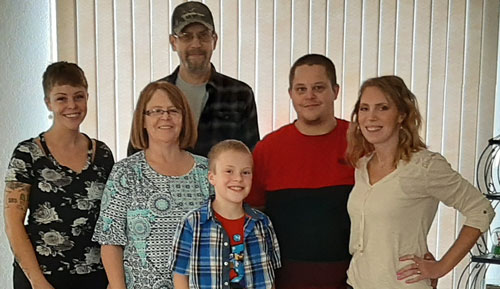William Marthaler
“I am grateful to St. Cloud Hospital and their commitment to heart treatments, all of which seemed futuristic to me.”
‘Futuristic’ Care Keeps Heart Beating
Aug. 24, 2020, was a typical workday for William Marthaler. “I felt a little tired that day but thought it was because it was a Monday,” he recalled. William, a 55-year-old husband, father and grandfather works as a mechanist at Columbia Gear in Avon. He remembers inspecting a part before suddenly collapsing. “Everything went dark,” William said. “I don’t remember anything at work from then on.”
William was in cardiac arrest. His co-workers quickly initiated CPR and called 911. Thankfully, Columbia Gear had an automated external defibrillator (AED) machine nearby and William’s co-workers hooked him up to it. First responders soon arrived at the scene to take William to CentraCare – St. Cloud Hospital. A defibrillator was used six times to shock William’s heart on the way to the hospital.
St. Cloud Hospital is home to the CentraCare Heart & Vascular Center, which is recognized for being one of the top hospitals in the nation for cardiology and heart surgery. Brian Stegman, MD, was the cardiologist who cared for William upon his arrival at the hospital.
“William was experiencing incessant ventricular tachycardia with severe heart muscle dysfunction,” Dr. Stegman said. This type of heart rhythm, caused by a heart attack, produces inadequate blood flow to the brain.
Medical staff immediately took William to the cardiac catheterization lab, but William struggled to return to a normal heart rhythm. He would need the help of an Impella heart pump, which is used in high-risk procedures to help supply blood flow to the rest of the body when the heart is not working properly.
“I placed the Impella pump and then was able to open up the blocked artery in his heart that was causing the heart attack,” Dr. Stegman said. William’s heart soon returned to a normal rhythm. From there he spent the next six days in the Cardiac Intensive Care Unit (CICU).
William’s heart was still weak. He required medication to keep his blood pressure up while remaining on the Impella. The medical staff was concerned about William’s potential for brain damage and started him on target temperature management (TTM), otherwise known as hypothermia protocol. This therapeutic protocol is used to improve survival and preserve brain function in patients who were resuscitated after a cardiac arrest but have not regained consciousness.
“I wasn't conscious until day four,” William recalled. When he woke up, his heart function had been restored and he was taken off the Impella. For the next three days William resided in the Telemetry unit while doctors placed an implantable cardioverter defibrillator (ICD) device. This device counteracts abnormal heart beats with an electric shock to return the heart to a normal rhythm.
After 10 days spent in the hospital, William was able to go home. Many people contributed to William’s successful outcome.
“Thanks to the ambulance crew, ER personnel, doctors, nurses and anyone else who played a part in my recovery in the CICU and Telemetry unit” he said. “I am grateful to St. Cloud Hospital and their commitment to heart treatments, all of which seemed futuristic to me.”
William also is thankful for his co-workers.
“I was told if it wasn’t for their quick actions, I wouldn’t have made it.
“I am grateful to be here for my wife and kids and that I get to see my grandson grow up.”
